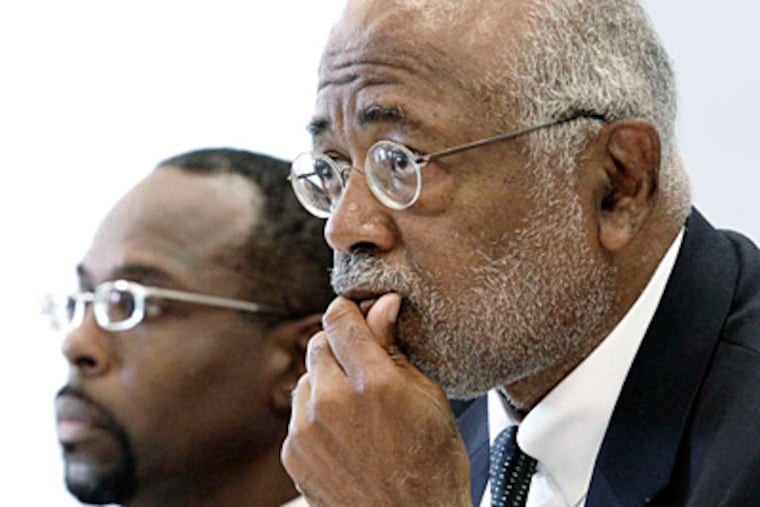WITH INTEREST: Are law firms with school-district, SRC ties getting big paydays?
WE'RE starting to think that the people who run the Philadelphia School District aren't worried about conflicts of interest.

WE'RE starting to think that the people who run the Philadelphia School District aren't worried about conflicts of interest.
From 2006 through this April, the district paid more than $40,000 for legal work to law firms that employed members of the School Reform Commission at the time. It has also paid millions to law firms that employed board members of the Children First Fund, a nonprofit with a stated mission of raising money for the district.
It's legal for the district to work with SRC board members' firms and firms tied to Children First.
But these payments raise questions about who gets paid by the district and why, especially after a recent report criticized state Rep. Dwight Evans for trying to steer a lucrative contract to a politically favored charter-school operator.
Although the district has 13 in-house attorneys, it often pays for outside lawyers. Michael Davis, the district's general counsel, defends this practice by saying that outside attorneys are sought because of their "past experience and abilities to be successful."
This year, the cash-strapped district plans to spend $2.5 million on outside attorneys, and $3 million on in-house lawyers.
These law firms need to be approved by the SRC, an appointed board charged with overseeing the district's policy and finances.
In 2010, the district paid $13,865 to Duane Morris, with which former SRC chairman Robert Archie is a partner. Since 2009, the district has also doled out $26,935 to Cozen O'Connor, with which former SRC board member David Girard-diCarlo is employed.
Davis said Duane Morris and Cozen O'Connor were utilized because of "unique circumstances," in which attorneys who were experts in zoning and labor law were needed immediately.
He said Girard-diCarlo and Archie had abstained from the votes to approve work for their own law firms, in accordance with state ethics law.
Philadelphia's Children First Fund came under fire this summer when it agreed to be the funnel for $405,000 in anonymous donations that would go toward former district Superintendent Arlene Ackerman's contract buyout. The anonymous donors eventually pulled out of the deal, but the fact that Ackerman, SRC chairman Archie and Ackerman's replacement, Leroy Nunery, were members of the nonprofit's board at the time raised questions - and eyebrows.
The district paid $73,000 this year to Saul Ewing, with which Children First Fund board member Robert Louis is a partner. Since 2008, it has paid $3.4 million to Blank Rome & Comisky, with which Michael Hanlon - a Children First Fund board member from 2008 to 2010 - is a partner. Patrick O'Connor, who was on the Children First Fund board from 2006 to 2008, is the vice chairman of Cozen O'Connor, which has been paid $434,936 by the district since 2006.
School district spokesman Fernando Gallard said that, in all these cases, "I do not believe there is any conflict of interest."
State ethics law requires public officials to abstain from voting on matters when they, their families, or the businesses with which they're affiliated stand to benefit financially. They must also publicly disclose the abstention.
Is that enough to protect against conflicts of interest?
Zack Stalberg, president of government-watchdog group Committee of Seventy, doesn't think so. He said paying firms that employ board members should be a "very orderly and very open" process.
"There has to be an explanation why only this law firm qualifies for this contract," he said. "Then the world gets to see whether that's a credible argument or not."
Barry Kauffman, executive director of good-government group Common Cause Pennsylvania, believes that the law should be even stricter. He said employers of public officials should be ineligible to receive contracts from the agencies that they're affiliated with during their service.
"Taxpayers deserve to have some kind of certainty that the money they are paying in taxes [is] being well-spent and not frittered away on some featherbedded contracts to friends of people in high office," he said.
Speaking of which, recent SRC appointee Pedro Ramos has said that his law firm, Trujillo Rodriguez & Richards, will not accept additional work from the district except on a pro bono basis.
Before Gov. Corbett tapped him for the position, he had been paid $325 an hour by the district as an outside lawyer. His firm was paid nearly $304,000 by the district last year.
"I don't want to be my own lawyer," he said, adding, "I prefer a clean-line relationship like that."